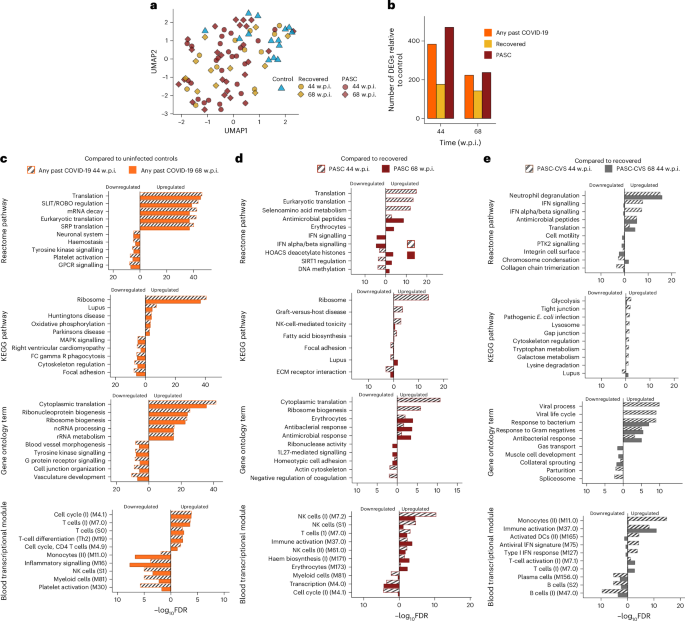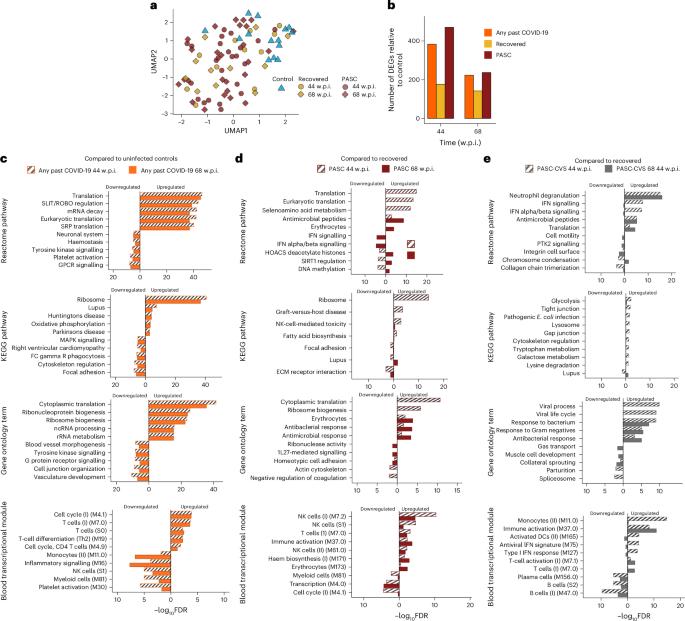Post-acute sequelae of SARS-CoV-2 cardiovascular symptoms are associated with trace-level cytokines that affect cardiomyocyte function
IF 20.5
1区 生物学
Q1 MICROBIOLOGY
引用次数: 0
Abstract
An estimated 65 million people globally suffer from post-acute sequelae of COVID-19 (PASC), with many experiencing cardiovascular symptoms (PASC-CVS) like chest pain and heart palpitations. This study examines the role of chronic inflammation in PASC-CVS, particularly in individuals with symptoms persisting over a year after infection. Blood samples from three groups—recovered individuals, those with prolonged PASC-CVS and SARS-CoV-2-negative individuals—revealed that those with PASC-CVS had a blood signature linked to inflammation. Trace-level pro-inflammatory cytokines were detected in the plasma from donors with PASC-CVS 18 months post infection using nanotechnology. Importantly, these trace-level cytokines affected the function of primary human cardiomyocytes. Plasma proteomics also demonstrated higher levels of complement and coagulation proteins in the plasma from patients with PASC-CVS. This study highlights chronic inflammation’s role in the symptoms of PASC-CVS. Sinclair et al. explore the contribution of chronic inflammation to cardiovascular symptoms associated with post-acute sequelae of SARS-CoV-2 infection (PASC-CVS). The authors identify trace levels of inflammatory cytokines in individuals with PASC-CVS that impair the function of cardiomyocytes derived from induced pluripotent stem cells.


SARS-CoV-2 急性后遗症的心血管症状与影响心肌细胞功能的痕量细胞因子有关
据估计,全球有 6500 万人患有 COVID-19 急性后遗症(PASC),其中许多人都有胸痛和心悸等心血管症状(PASC-CVS)。本研究探讨了慢性炎症在 PASC-CVS 中的作用,尤其是在感染后症状持续一年以上的人群中。从三组人(康复者、PASC-CVS 患者和 SARS-CoV-2 阴性患者)的血液样本中发现,PASC-CVS 患者的血液特征与炎症有关。利用纳米技术在感染后 18 个月的 PASC-CVS 献血者血浆中检测到了痕量水平的促炎细胞因子。重要的是,这些痕量级细胞因子会影响原代人类心肌细胞的功能。血浆蛋白质组学还显示,PASC-CVS 患者血浆中的补体和凝血蛋白水平较高。这项研究强调了慢性炎症在 PASC-CVS 症状中的作用。
本文章由计算机程序翻译,如有差异,请以英文原文为准。
求助全文
约1分钟内获得全文
求助全文
来源期刊

Nature Microbiology
Immunology and Microbiology-Microbiology
CiteScore
44.40
自引率
1.10%
发文量
226
期刊介绍:
Nature Microbiology aims to cover a comprehensive range of topics related to microorganisms. This includes:
Evolution: The journal is interested in exploring the evolutionary aspects of microorganisms. This may include research on their genetic diversity, adaptation, and speciation over time.
Physiology and cell biology: Nature Microbiology seeks to understand the functions and characteristics of microorganisms at the cellular and physiological levels. This may involve studying their metabolism, growth patterns, and cellular processes.
Interactions: The journal focuses on the interactions microorganisms have with each other, as well as their interactions with hosts or the environment. This encompasses investigations into microbial communities, symbiotic relationships, and microbial responses to different environments.
Societal significance: Nature Microbiology recognizes the societal impact of microorganisms and welcomes studies that explore their practical applications. This may include research on microbial diseases, biotechnology, or environmental remediation.
In summary, Nature Microbiology is interested in research related to the evolution, physiology and cell biology of microorganisms, their interactions, and their societal relevance.
 求助内容:
求助内容: 应助结果提醒方式:
应助结果提醒方式:


